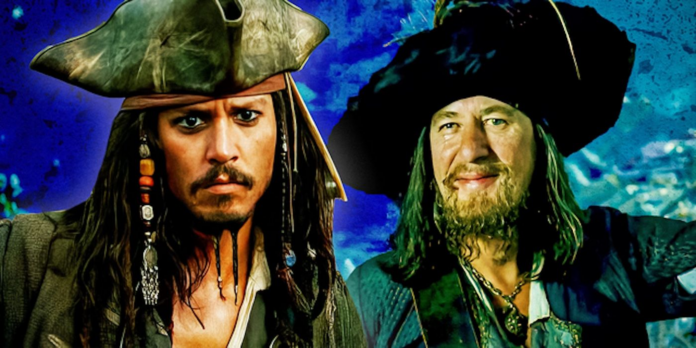Although the Pirates of the Caribbean movies were never airtight when it came to plotting, this doesn’t make one irritating plot hole from At World’s End any easier to excuse. 2003’s The Curse of the Black Pearl was an unlikely hit. Pirates movies had historically underperformed throughout the ‘80s and ‘90s, with studios left reeling by costly flops such as Cutthroat Island and Pirates: The Movie. As such, it was a welcome shock when the original Pirates of the Caribbean movie not only succeeded at the box office but also became an unlikely critical hit.
Related 10 Harsh Realities Of Rewatching Pirates Of The Caribbean’s Original 2003 Movie While 2003’s The Curse of the Black Pearl is a blockbuster classic, the original Pirates of the Caribbean movie did set up the franchise’s problems.
However, although the Pirates of the Caribbean sequels were box office successes, the franchise’s critical acclaim was short-lived. Part of the reason for this was the byzantine plotting of the original movie’s follow-ups. Filled with double-crosses, deception, and way too many warring factions, the Pirates of the Caribbean sequels were needlessly complex webs of intrigue wherein countless conspirators vied for supremacy. This came to a head in 2007’s At World’s End, the final movie of the original trilogy. This outing brought together the Brethren Court, an international coterie of Pirate Lords.
Jack Is The Pirate Lord Of The Caribbean Sea, While Barbossa Is Lord Of The Caspian Sea
Barbossa’s Base Of Operations Contradicts His Title
Close
The Brethren Court doesn’t make a lot of sense when subjected to scrutiny, but the most confusing element of the Pirate Lords is their territories. Ostensibly, Jack Sparrow is the Pirate Lord of the Caribbean, while his former enemy/ current co-conspirator, Captain Barbossa, is the Pirate Lord of the Caspian Sea. This is plainly wrong since, as canny viewers will have noted from the title of the series, Barbossa operates primarily in the Caribbean Sea even though he is the Pirate Lord of the Caspian Sea. Admittedly, it is fair to guess that the Pirate Lord occasionally fights over territory.
Even the scenes where Barbossa works outside the Caribbean don’t take place anywhere near the Caspian Sea
However, this alone doesn’t excuse the oversight. After all, it is striking that viewers only ever see Barbossa working in the Caribbean when he is theoretically the Pirate Lord of another sea entirely. Moreover, even the scenes where Barbossa works outside the Caribbean don’t take place anywhere near the Caspian Sea. Barbossa does work in the Mediterranean but, while he is Pirate Lord of the Capsian Sea in the original trilogy, he never even seems to visit the location. The Pirates of the Caribbean movies have plenty of Barbossa plot holes, but this is one of the most egregious.
All The Other Pirates Lords In At World’s End Seem To Be Captains Of Their Own Ships
Barbossa And Jack’s Battles Over Captaincy Complicate Their Positions
Close
To make matters worse, Barbossa’s Pirate Lord position also doesn’t make sense given his professional relationship with Jack. Each of the other Pirate Lords is the captain of their own ship, which makes sense given the power they wield. As Lords of entire seas and oceans, they need at least a ship and a crew at their command. However, Barbossa was Jack’s first mate when Jack was captain of the Black Pearl before the events of The Curse of the Black Pearl. He did become captain after staging a mutiny, but this only complicated things further.
No matter which one of them is the ship’s captain at a given time, either Barbossa or Jack Sparrow must be a Pirate Lord without a ship when the other captains the Black Pearl. In this regard, it is not really a question of who is manning the ship, but more an issue of why two Pirate Lords of two seas that are nowhere near each other were left fighting on the same ship in the first place. Since On Stranger Tides saw Jack and Barbossa team up again and Dead Men Tell No Tales depicted them as friends, this enshrined power struggle is bizarre.
Jack & Barbossa Both Being Pirates Lord Summarizes The Whole Problem With The Brethren Court
The Brethren Court Doesn’t Really Add Up In At World’s End
The Brethren Court had the potential to be an interesting addition to the mythos of the franchise at large, but At World’s End never properly explains how the Pirate Lords operate. Although At World’s End devotes a lot of screen time to their meetings, the Brethren Court’s customs don’t really make sense in the Pirates of the Caribbean movies. What makes this more frustrating is the fact that they appear to have been added to make the movie’s story more exciting and dramatic.
Movie Release Year Rotten Tomatoes Score Pirates of the Caribbean: The Curse of the Black Pearl 2003 80% Pirates of the Caribbean: Dead Man’s Chest 2006 53% Pirates of the Caribbean: At World’s End 2007 44% Pirates of the Caribbean: On Stranger Tides 2011 33% Pirates of the Caribbean: Dead Men Tell No Tales 2017 30%
To this end, it is striking that the Brethren Court doesn’t play a pivotal role in defeating the villains at the end of At World’s End. During the murky, chaotic final battle, most of the important moments go to Will, Elizabeth, Jack, and Tia Dalma. Even Bootstrap Bill plays a bigger role than most of the Pirate Lords, who are effectively only there to provide backup. This is a disappointing end for Pirates of the Caribbean characters who had a lot of untapped potential.


